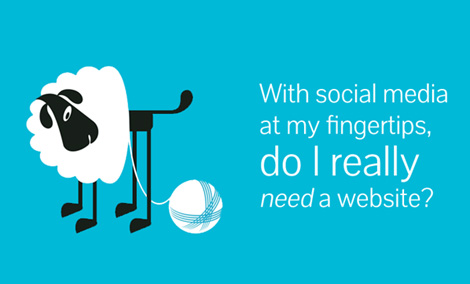
With all these blogging and social media options for marketing - Do I really need a website?
I wrote this post for Women Unlimited Worldwide but thought I would include it here too! Hope you find it useful!
We spend a lot of our time creating bespoke websites, so it’s a strange question for me to be attacking. Do I really want to even put this question in your mind?
But here I am bravely writing about this.
Why would I even bring this up?
I know you won’t be able to get value from this post unless I answer this question. So there are 3 reasons.
- I really think you should only spend money only when you know there is a return– and you need to consider every investment carefully. An amazing fully thought out well designed expertly written and carefully marketed website with all the blogging and social integration can be quite expensive for a small or start-up business.
- There are alternative options you can consider, as your business grows, and you can take things in phases. Safer, and it still works! You can dream about your ideal website now, and have the alternative options in the meantime.
- I want you to know how nice I am.
Remember, this depends on the business.
Sometimes it just won’t fly to have NO website. For example, if you run a professional services company like an accountant, management consultancy, law firm or IFA I don’t think you can get away with the “no website” option. Similarly any type of agency might also not give the right impression.
But solopreneurs or those who or a small consultancy business could definitely consider getting started with one of the alternative options – as long as they have a really good presentation and activity.
I recently bought something from a company that didn’t have a website. Only a Facebook page.
It just proves it’s possible. I am still in the middle of talking to this company so at this time of writing I won’t be mentioning their name but I will be soon. But what happened was:
- Someone I knew mentioned this product and said it was right up my street (being owl related – this friend of mine knows about how we use owls in our branding at TLD)
- I looked to buy them online and ended up ordering via email as I didn’t see a website. Partly because I want to support other businesses, and partly because I like the product!
So there are choices. You can just have social media but what social media does is open the door – it doesn’t close the sale.
Would a website create more opportunities for this company?
I was thinking about what they could have had on the website – these are the things that would help them in future:
- Contact information for who is in the company one of the main reasons people look up a website is to get contact details.
- What to expect when you buy (in this case it was a product so colours and options, delivery time etc) but in service based businesses it would be the way the company takes clients through their services.
- Credibility building information like testimonials, case studies, awards, memberships, credentials and advice blog posts
- The ability to order/buy the products online – Since this was a product led business – it would either be on their own site, or via an existing site like Etsy (which is for handmade items only, and this product would qualify).
These are the sorts of thing that help turn visits to your company website into enquiries about the services/buying the products described on your site.
By nature websites allow people to choose what they want to learn more about. This is because they have headlines, navigation links, boxes, images and buttons which let people click onto different areas that interest them. A unique website – if it’s professional and well designed, will help differentiate the company and introduce the brand.
However, there are other options for those who can’t afford this in their business right away – and since you have read this far, here they are:
A single page website – with this you can put in enough information to introduce the brand and give services and contact information. The single page website can always be added to later. You can also include links to all your social profiles, a Twitter feed, embedded YouTube videos, etc. We have done quite a few of these, and they have served our clients extremely well.
See some examples here:
Just a blog – Of course a full website with an integrated blog is best, but you can start with a blog – WordPress or Tumblr. The benefit of this is you can start creating content and sharing that on social media. This archive of content can be migrated to a full site when you are ready for it. And you get to work on the HABIT of blogging, often the biggest challenge for small businesses. But remember this has to be professionally presented. Pay attention to detail, use a great design and format your posts properly.
Just a Facebook business page – Like my example, you can even start with this, relying on the good word of others and social sharing. If you have just a Facebook page, study up on best practices. Keep your updates regular and visual, resize your images for Facebook. Include good information in the “about” section. In addition, as part of your content plan, include regular reminders of the credibility building elements interspersed with images relating to your team and offering.
So, I have bravely spelled it out – what do you think?
Would love to hear your thoughts in the comments – have you ever seen a business running without a website? Has it affected your opinion of them? What if they had used some of the advice above – and made sure their “alternative options” were awesome? Would that have helped? Over to you!


